ZMA is a combination of three supplements that helps muscle recovery and improve the quality of your sleep.
It also aims to increase your levels of testosterone and improve your body’s ability to adapt to and improve from strength training through the combined action of zinc, magnesium, and vitamin B6.
Because of this, it’s very popular with weightlifters, sprinters, football players, and other athletes. If you want a more strength and power in exchange for your hard work at the gym, or want to improve the sleep you get at night, read on–we’ve ranked the ten best ZMA supplements on the market.
Research
Rankings
1. Optimum Nutrition ZMA
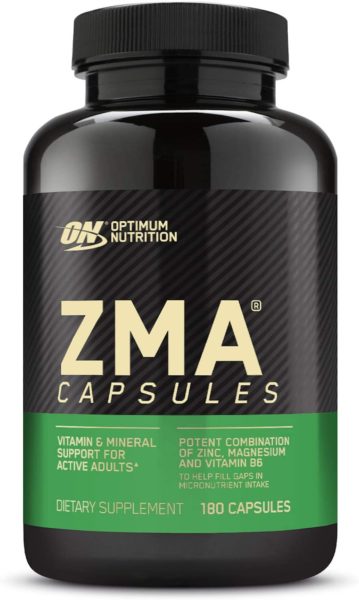
Optimum Nutrition makes a great ZMA supplement with the right ratio of zinc, magnesium, and vitamin B6, with no extraneous ingredients.
Each capsule has 3.5 mg of vitamin B6, 150 mg of magnesium, and 10 mg of zinc. Delivered in a gelatin capsule and using only cellulose and magnesium stearate to hold the ingredients together, this ZMA supplement scores well on purity, too.
2. Nugenix PM ZMA Testosterone Support
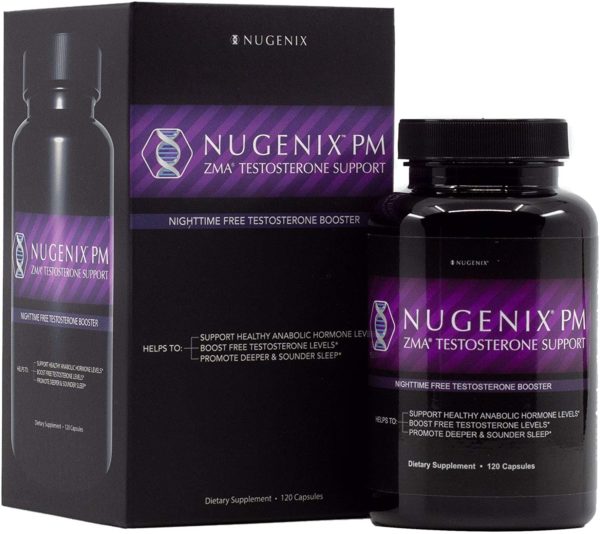
Nugenix has an innovative take on the classic ZMA supplement. It’s got exactly the same industry standard distribution of zinc, magnesium, and vitamin B6, but in addition, Nugenix adds in an extra testosterone boost in the form of tribulus terrestris fruit extract and a sleep aid in the form of melatonin.
This means Nugenix will amplify both the testosterone-boosting properties of ZMA as well as the improvements to your sleep. Purists might not like these additional ingredients, especially because the melatonin means you need to take it soon before bed, but for everyone else, this is an excellent choice.
3. Evlution Z-Matrix
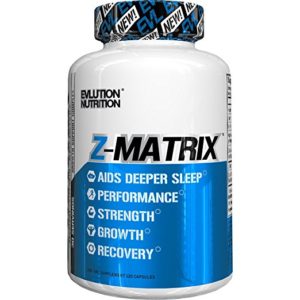
Evlution, lauded for its high-quality pre-workout and fat-burning supplements, has its own take on ZMA. It’s designed to be taken right before bed, and it has all three standard ZMA ingredients.
What’s special is what else is in the supplement. There’s a substantial amount of vitamin D3 (500 IUs) as well as folic acid, L-theanine, and BioPerine black pepper extract for superior absorption.
Theanine will help with sleep, but unlike other nighttime ZMA supplements, this doesn’t contain melatonin, so you don’t have to take it immediately prior to bed.
4. MP Essentials Z-Core PM
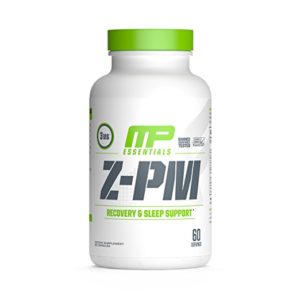
MusclePharm’s take on ZMA includes all the usual suspects, but takes a distinct focus on boosting testosterone levels while you sleep. Because it includes melatonin, it will improve your ability to fall asleep and stay asleep.
Thanks to fenugreek extract and copper glycinate, you’ll get an additional boost to testosterone at night, which should improve your recovery from workouts.
5. SNAC Nutrition ZMA-5
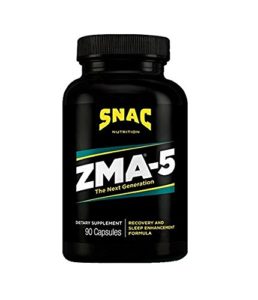
All brands of ZMA have to licence the name from SNAC Nutrition–it’s the company that originally innovated the zinc, magnesium, and vitamin B6 blend. Now, they have an updated formulation that includes the neurotransmitter 5-HTP, folic acid, and BioPerine for superior absorption.
The inclusion of 5-HTP indicates that this supplement might also be suitable for improving mental function and performance, making this a great choice for athletes who need to gain strength, power, and mental acuity at the same time.
6. Now Sports ZMA
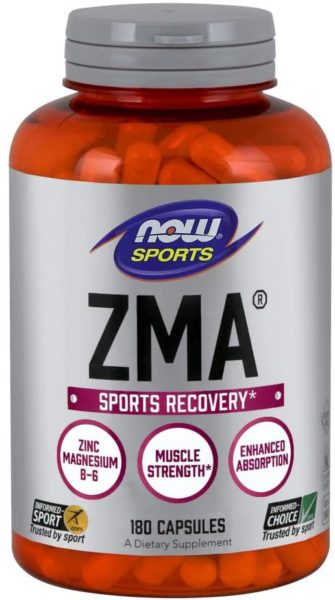
Now Sports ZMA is a little stronger on the vitamin B6 than other ZMA supplements, with 5 mg per capsule. At 150 mg of magnesium and 10 mg of zinc, it’s right in line with industry standards with respect to these ingredients.
The supplement is designed pretty clean, without any undesirable extra ingredients. It’d be nice if there were more capsules per bottle, but that’s about the only drawback that you can find with Now Sports ZMA.
7. Primaforce ZMA
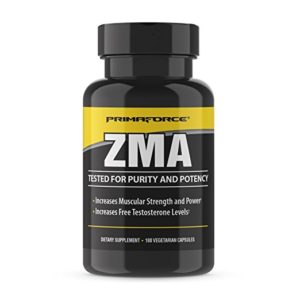
Primaforce follows industry standards to a T with their ZMA formulation, and the bottle is more generous than most with regards to the number of capsules included.
It would be better if Primaforce didn’t rely on silicon dioxide as a binder and anti-caking agent, but aside from that, Primaforce ZMA is a solid choice.
8. ZMA Pro
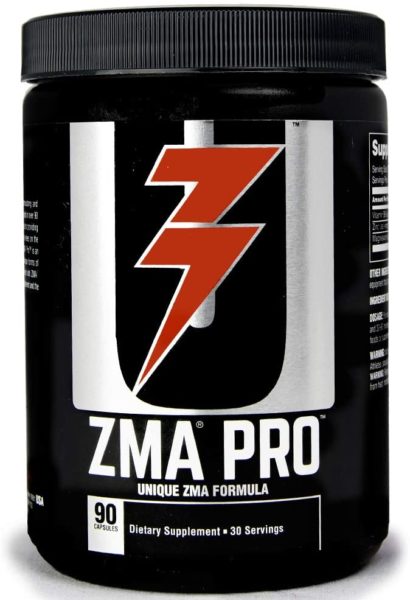
ZMA Pro is a pretty standard formulation, though it uses what it calls a “quick release formulation” to increase the rate at which the ingredients are absorbed.
Given that there is nothing special or unusual in the ingredients, this must mean they just divide the powder up more finely to speed its absorption. If you follow standard protocol and take ZMA before bed, this probably doesn’t make a difference.
You’ll have eight hours or more to absorb the ZMA in a regular supplement, and a slower, sustained release might even be preferable.
9. Met-Rx ZMA
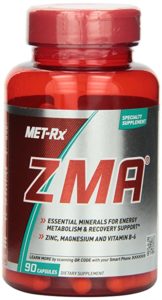
Met-Rx has a pretty standard ZMA formulation, though it’s more difficult to endorse than some of its competitors simply because it doesn’t have the same reputation as a solid manufacturer of other quality sports supplements.
Given the athletic background and intent of ZMA, it might make sense to go with a manufacturer that’s specifically focused on that market, because the precise blending of the zinc-containing ingredients in ZMA is a little tricky to get right.
10. VitaDirect ZMA
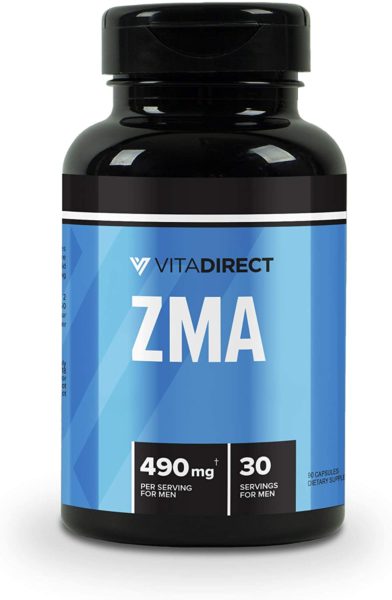
VitaDirect is a pretty simple ZMA formulation – it has doses of zinc and magnesium that are more or less in line with what you’d find in a top supplement, but where it suffers is bioavailability. Instead of including multiple different sources of zinc and magnesium, it relies on just one for each, which lands it further down in the rankings.
Category winners
Best ZMA overall: Optimum Nutrition ZMA
Whether for sports performance, better sleep, or better recovery, Optimum Nutrition ZMA is a great all-around supplement. It stays true to the original research behind ZMA: it includes three forms of zinc, two forms of magnesium, and vitamin B6, providing a powerful boost to recovery and muscular adaptation.
Best ZMA for sleep: Nugenix PM
For using ZMA for a better night’s sleep and better nighttime recovery, Nugenix PM is the perfect tool: it includes an optimal dose of zinc and magnesium, plus melatonin for deep, restful sleep.
Best ZMA for athletes: Optimum Nutrition ZMA
Optimum Nutrition ZMA is great for athletes thanks to its hyper-pure formulation and highly bioavailable ingredients. It has nothing extraneous, just great, highly-absorbable sources of zinc and magnesium aspartate.
Best ZMA for women: Evlution Z-Matrix
For women, ZMA is best used to support recovery, especially at night. We recommend Evlution Z-Matrix, as it’s specially formulated for overnight recovery thanks to its inclusion of theanine and folic acid. Both these compounds can help women recover and improve more after tough training sessions.
Best ZMA for boosting testosterone: MusclePharm Essentials Z-PM
To raise your testosterone levels, opt for a ZMA supplement that’s got an adequate dose of both zinc and magnesium—two minerals with a proven connection to higher testosterone levels. MusclePharm Essentials Z-PM provides both in ample supply, plus includes the testosterone-elevating compounds copper and fenugreek extract.
Best ZMA for calorie-restricted diets: Optimum Nutrition ZMA
Optimum Nutrition ZMA is great for anyone in sports with weight classes, or athletes who are cutting body fat. ZMA supplements are especially useful if your dietary intake of zinc and magnesium is restricted, and the high dose supplied by Optimum Nutrition is great for ensuring you maintain muscular strength and power even during weight loss.
Who should buy ZMA?
ZMA is a supplement that contains zinc, magnesium, and vitamin B6, and was originally designed for elite athletes. ZMA still is most popular among competitive athletes who are looking for any edge they can get to improve their training.
Unlike a pre-workout supplement or even a caffeine pill, ZMA is not intended to improve your workout performance immediately. Instead, it is designed to enhance your recovery and boost your testosterone levels. If ZMA can bring about these effects, your workout quality and performance level will steadily improve over the long term.
The people who will benefit most from ZMA are competitive athletes. If all you do is exercise for fitness or general health, you’re not likely to need what ZMA delivers.
The performance benefits will be so slight relative to your workout intensity that it’s probably better to not take it at all.
A competitive athlete, especially in sports that have weight classes or put a high priority on power to weight, may benefit more because ZMA may only be effective when your dietary intake of zinc, magnesium, or vitamin B6 is inadequate.
How we ranked
ZMA was originally a proprietary formulation, but now it’s a generic term for supplements that follow the same general template: zinc monomethionine aspartate, plus magnesium and vitamin B6.
Since our goal was to make our rankings scientifically-based, we first chose supplements for consideration that had all three ingredients. While you’ll often find zinc and magnesium in combination in other supplements with similar goals, like testosterone boosters or HGH supplements, we did not include these supplements in our rankings.
After eliminating those supplements that were not quite “real” ZMA, we started looking at the ratios and dosages of zinc, magnesium, and vitamin B6.
We compared these with the amounts of each ingredient used in the scientific research on ZMA, and in particular, the doses used in the studies that found a successful result of ZMA on either performance or androgen levels, or both.
We did consider supplements that put an additional twist on ZMA, as long as it had the traditional three ingredients. We were more open to this possibility with ZMA than we would be with other proven supplements, because the direct evidence for the efficacy of zinc is not as strong as the evidence for other supplements.
So, adding a unique ingredient like tribulus terrestris or melatonin could strengthen the efficacy of the supplement.
We were looking for additional ingredients that would balance out or synergize well with the effects of ZMA: ingredients like melatonin scored well, because ZMA is intended to be taken before bed to enhance sleep quality and hence recovery after a tough training session.
Melatonin, in turn, is a hormone that controls your body’s circadian cycle, and is known to enhance sleep quality and increase sleep duration.
We gave extra points to supplements with nice perks like melatonin. In contrast, we penalized or even completely eliminated supplements that used countervailing ingredients, such as any sort of stimulant ingredients. That would jack up your energy levels, which is not what you want right before bed.
Finally, we applied our usual criteria on supplement purity and supplement design. We rewarded manufacturers who made pure, high-quality products without any extraneous and unnecessary binders, stabilizers, or preservatives, and penalized supplements that included too many of these kinds of ingredients.
The remaining products, sorted by overall score and quality, represent the best ZMA supplements available on the market right now.
Benefits
Taking a ZMA supplement may improve your sleep, improve your strength, and improve your muscular power. This multi-ingredient supplement is used by elite athletes to work out harder and recover better afterwards.
How exactly does ZMA help you accomplish this? It appears to have something to do with how ZMA affects your levels of testosterone (which is why ZMA is found in many testosterone boosters) and other hormones.
ZMA was made for elite athletes. Initially formulated by nutrition and performance researcher Victor Conte, who later became famous for his involvement in a doping scandal with elite American Sprinters, ZMA was initially used in NCAA football players to improve strength.
A 1999 study looked at the effects of an 8-week ZMA supplementation routine among football players during spring training (1).
This study found that the ZMA supplement led to increased levels of zinc and magnesium in the bloodstream of the players compared to the placebo supplement, and further, the athletes given the ZMA supplement had a greater increase in high-velocity muscular strength compared to the athletes on the placebo.
It might seem a little strange to be taking a supplement developed by someone who was peddling growth hormone on the side, but then again, who else would know how to manipulate human hormones better?
ZMA isn’t a miracle supplement, but it’s still being used by elite athletes in dozens of sports to gain an edge in training and in competition.
ZMA could boost your testosterone levels. It’s no accident that two of the primary ingredients in ZMA are closely linked to testosterone levels.
A 1996 study published in the scientific journal Nutrition examined the effects of zinc on the body’s testosterone levels in detail (2).
The authors, based out of Wayne State University, the University of Michigan, and Harvard Medical School, looked at bodily levels of zinc as they related to serum testosterone levels in a group of men who were 20 to 80 years old. They found a strong positive correlation between zinc levels and testosterone levels–the more zinc in your body, the higher your testosterone is.
The researchers took this one step further by demonstrating a causal relationship. In a subset of four young men, the authors measured testosterone levels before and after a brief period of zinc restriction. The men were fed a tightly controlled diet that was deficient in zinc, and as a result, their zinc levels in their body went down.
And just as you’d predict, their testosterone levels dropped too. To demonstrate the effect working in reverse, the authors took another set of nine men in their sixties who were deemed “marginally deficient” in their zinc levels and put them on a zinc supplement for six months.
After the supplementation program, the men’s testosterone levels increased significantly.
The magnesium in ZMA is linked to higher testosterone too. The case for a link between magnesium levels and testosterone levels comes from a study published in the International Journal of Andrology in 2011 (3).
The study looked at nearly 400 men that were part of a major study in Italy. All of the men had blood samples taken at the beginning of the study, and the authors analyzed the blood sample data to uncover whether any relationship existed between magnesium levels and testosterone.
Using careful statistical methods to control for possible confounding variables, the authors demonstrated that higher magnesium levels in the blood is linked to greater levels of testosterone, and greater levels of insulin-like growth factor 1 (IGF-1), another hormone strongly linked to strength, energy, and virility.
The vitamin B6 in ZMA plays a role in hormonal regulation as well. Vitamin B6, along with the other B vitamins, is not so much of a vitamin as it is a hormone that happens to be derived from sources outside the body. It’s involved in a tremendous number of biological interactions, many of which are detailed in a 1994 review article by David A. Bender from University College London (4).
In it, Bender shows how vitamin B6 interacts with a number of steroid hormone receptors, which suggests that any deficiencies in vitamin B6 could interfere with your body’s ability to adapt to athletic training.
While there isn’t any direct research on how vitamin B6 affects hormone levels or athletic fitness, it’s likely that athletes who are deficient–such as bodybuilders trying to cut weight–will experience performance decrements as a result.
ZMA doesn’t work for everyone. Not all research has found success using ZMA to boost athletic performance. A 2004 study in the Journal of the International Society of Sports Nutrition investigated whether ZMA could improve anabolic hormone levels or performance in one rep max bench press or leg press (5).
The study involved 42 athletes who were experienced weight lifters. They took a ZMA supplement or a placebo every night before bed for 8 weeks and were given a standardized weight lifting program to follow.
The authors evaluated maximal strength and hormone levels at the study’s outset, 4 weeks into the study, and at the conclusion. Disappointingly, they found no evidence of an effect for ZMA on any of the measurements of interest.
This might indicate that ZMA only works if you are borderline deficient in one or more of the ingredients in ZMA, or this study may have been simply too small to detect an effect–21 subjects per group could be too small to observe a small to moderate boost in athletic performance.
Other research has found a similarly insignificant effect from ZMA on testosterone. A scientific paper published in the Annals of Biological Research in 2013 by a team of researchers in Iran examined the effects of a ZMA supplement on performance and anabolic hormone levels in weightlifters (6).
The study was pretty small—only six people in the control group and six people in the experimental group. However, both groups underwent seven weeks of hard training six days per week, and the researchers measured testosterone, cortisol, vertical jump, and squat performance, to name a few metrics.
Over the course of training, both groups improved their strength levels, but the ZMA supplement had no effect on testosterone or cortisol. Though it might have been nice to see good results in a study on high level athletes, it’s also quite possible that the study was just too small.
Six athletes in each group is exceptionally small, even for a nutrition study (a field that’s infamous for small sample sizes to begin with). Alternatively, this might be a manifestation of a different theory: that ZMA does not benefit athletes who have a healthy diet and normal levels of micronutrients in their body already.
A summary of ZMA supplementation in the journal Evidence-Based Medicine reviewed a range of randomized controlled trials that looked at ZMA supplementation and testosterone levels (7).
This review, designed for physicians looking to follow evidence-based practices, concluded that ZMA does not affect testosterone, at least among men taking typical ZMA supplement doses.
Side Effects
ZMA appears to be a safe supplement, with no reports of negative side effects and no worrisome ingredients. As with any mineral supplement, if your intake levels are excessive, you could have problems.
If you already take other supplements that have zinc and magnesium in them, you may want to make sure you aren’t taking way too much of either of those ingredients.
It is possible to get zinc toxicity from excessive intake of zinc. When consumed at levels of 150-450 mg per day, zinc can cause low copper levels, inhibited iron function, and paradoxically, poor immune function (8).
The problem with chronically high zinc intake is that zinc competes with other trace metal micronutrients for absorption, such as copper. Copper has its own set of important biological roles, and even moderate amounts of supplemental zinc have been found to have an effect on copper absorption enzymes.
Some long-term research also suggests that supplements that include zinc could increase your risk of urinary tract infections. That finding is based off a large randomized controlled trial that tested the effects of eye vitamins on the risk for macular degeneration in older adults.
This experiment (while quite successful–see our eye vitamins article for more info) found a small increase in risk for urinary problems among the people taking the eye vitamin, which included zinc, just like a ZMA supplement.
For most athletes, this won’t be a problem, but high levels of zinc intake over the long term could prove to be a problem, especially for older adults.
So, while ZMA might be potentially useful for short-term performance, it’s not a good long-term supplement for overall health. Aside from that, the safety profile of this supplement looks very good.
Recommended Dosage
The original formulation of ZMA involves 15 mg of vitamin B6, 450 mg of magnesium, and 30 mg of zinc per serving. For most ZMA supplements, that’s three capsules per day.
While some manufacturers deviate from this a little bit, it’s wise not to stray too far from these levels, because you are straying outside the range of dosages that have been studied in the scientific literature, and as such you may not get the same effects.
FAQ
Q: What is ZMA?
A: ZMA is a three-ingredient supplement that is based on zinc, magnesium, and vitamin B6.
It was originally developed to help elite track and field sprinters recover better after difficult workouts, but it has been widely adapted by bodybuilders and high level athletes of all stripes. ZMA aims to speed your recovery, improve sleep quality, and increase testosterone levels.
Q: What does ZMA do?
A: ZMA supplies your body with two important trace minerals and one key vitamin. The combination of zinc, magnesium, and vitamin B6 is thought to help your body boost levels of androgen steroids like testosterone and improve your recovery, particularly when you are asleep.
Interestingly, research on older men who are often deficient in zinc and magnesium has found that supplemental sources of these minerals are able to increase testosterone levels and improve sleep quality.
While vitamin B6 is a critical hormone for performance and recovery, its exact mechanism of action with regards to its inclusion in ZMA is less clear. Nevertheless, it’s a staple ingredient of all ZMA products on the market.
Q: Is ZMA a testosterone booster?
A: Both the zinc and magnesium that are included in ZMA are known to boost testosterone levels, at least among people who have marginally or significantly low levels of these trace elements.
The precise role that trace minerals play in the synthesis of testosterone and related compounds is complex, but it is well-known that deficiencies in these minerals can be associated with low testosterone levels, and that correcting these deficiencies can increase testosterone levels.
However, what is less clear is what proportion of high level athletes are deficient in magnesium or zinc, and what proportion of these athletes would actually benefit from a ZMA supplement.
Q: Is ZMA a steroid?
A: ZMA has a strong association with steroids, because of the career of the man who initially developed ZMA, but no, ZMA itself is not a steroid. ZMA was developed by Victor Conte of the infamous BALCO corporation, which become nationally known for its involvement in a track and field doping scandal.
Some people think that ZMA was a cover story for the highly sophisticated steroids that were developed by BALCO, but the actual ingredients of ZMA are pretty simple and definitely not steroids.
Q: Does zinc in ZMA help you sleep?
A: While zinc is not as well-studied of a sleep aid as melatonin or chamomile, there is some evidence linking zinc to better sleep. One study published in 2012 in the journal Biological Trace Element Research found that higher levels of zinc in hair samples (a proxy for dietary zinc intake over long periods of time) were associated with optimal sleep duration, compared to people who had lower levels of zinc (9).
Interestingly, copper levels played a role in sleep quality as well, and copper is known to compete with zinc for absorption. So much so, in fact, that supplementing with too much zinc can actually depress copper levels over long periods of time.
These findings might suggest that moderate levels of zinc intake—not too high and not too low—would be optimal for sleep quality.
Q: Do you have to take ZMA at night?
A: ZMA was originally designed to be taken at night because it was thought that it improved sleep quality, and on top of that, the zinc and magnesium would create a surge in testosterone which would increase muscle anabolism as you slept. Both of these factors were intended to combine to result in better workout recovery.
That being said, there’s nothing about ZMA that makes it mandatory that you take it before bed. Unlike melatonin or other sleep aids, or caffeine and other stimulants, none of the ingredients in ZMA actually modulate your body’s sleep-wake cycle.
Thus, if you really don’t want to take ZMA before bed, there’s likely little to no harm taking it at a different time of day.
Q: Is ZMA good for bodybuilding?
A: ZMA is popular among bodybuilders because it is thought to enhance workout recovery, and does so without adding any calories to your diet.
Bodybuilders are also obsessively concerned with their testosterone levels, so anything that stands even a small chance of boosting testosterone is an attractive choice for a bodybuilder. While ZMA is not the end-all be-all supplement for adding muscle and cutting fat, it can be occasionally useful tool for your nutritional toolkit.
Q: What does ZMA stand for?
A: ZMA stands for Zinc Monomethionine Aspartate, though many people think the “M” stands for “magnesium” because it’s the second ingredient of the three.
Oddly, the third key ingredient in ZMA isn’t indicated in the acronym either, but it’s vitamin B6, which has strong hormonal effects. Despite the lack of utility in the name, “ZMA” stuck, and now it refers to a specific blend of magnesium amino acid chelate, magnesium, and vitamin B6.
Q: Why does ZMA cause vivid dreams?
A: Some people who use ZMA report that it gives them strong, vivid, or memorable dreams. The effects of any supplement on dreams is not a highly researched topic, but some circumstantial evidence does suggest a potential explanation for why ZMA might “enhance” your dreaming experience.
Both zinc and magnesium are through to contribute to improved sleep quality, which would translate into increased REM sleep, which is the portion of sleep in which your most intense dreaming happens. So, by enhancing the amount of REM sleep you get, ZMA might cause vivid dreams. This is just a hypothesis, though—don’t take this as the final word on ZMA and dreaming.
Related articles
- Zinc
- Vitamin B6
- Magnesium
- Post-workout supplement
- Eye vitamin
- Sleep aid
- Melatonin
- Testosterone boosters
- Tribulus terrestris
Recap
ZMA looks like a solid supplement that attacks two major causes of low testosterone, and it also looks like it can help improve your strength if you are an athlete in training.
For these reasons, it’s widely used by high-level athletes. If you want to boost your testosterone levels and increase your muscular strength or even improve your sleep, you could take advantage of these benefits too.
For BodyNutrition’s #1 ZMA recommendation, click here.